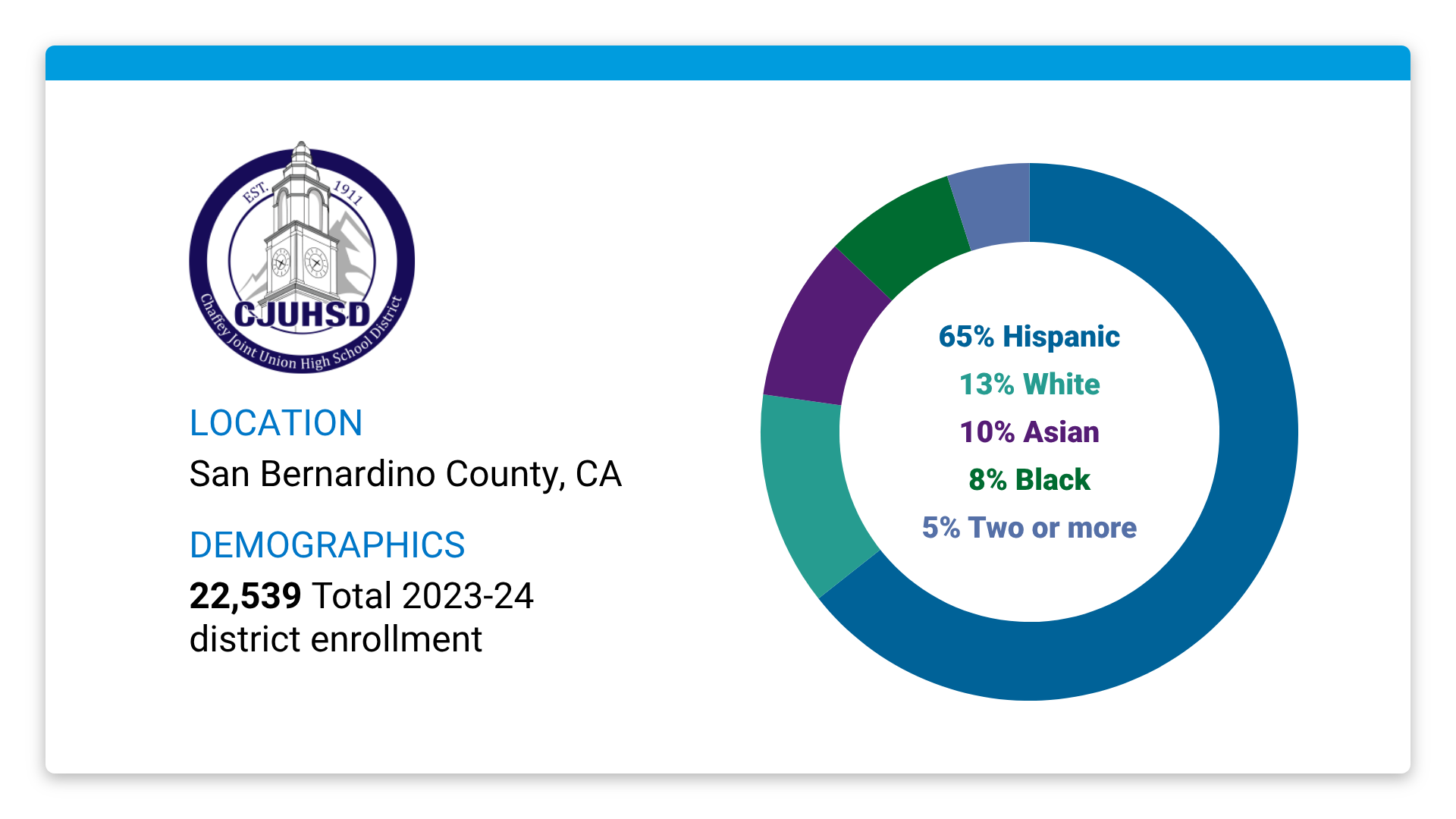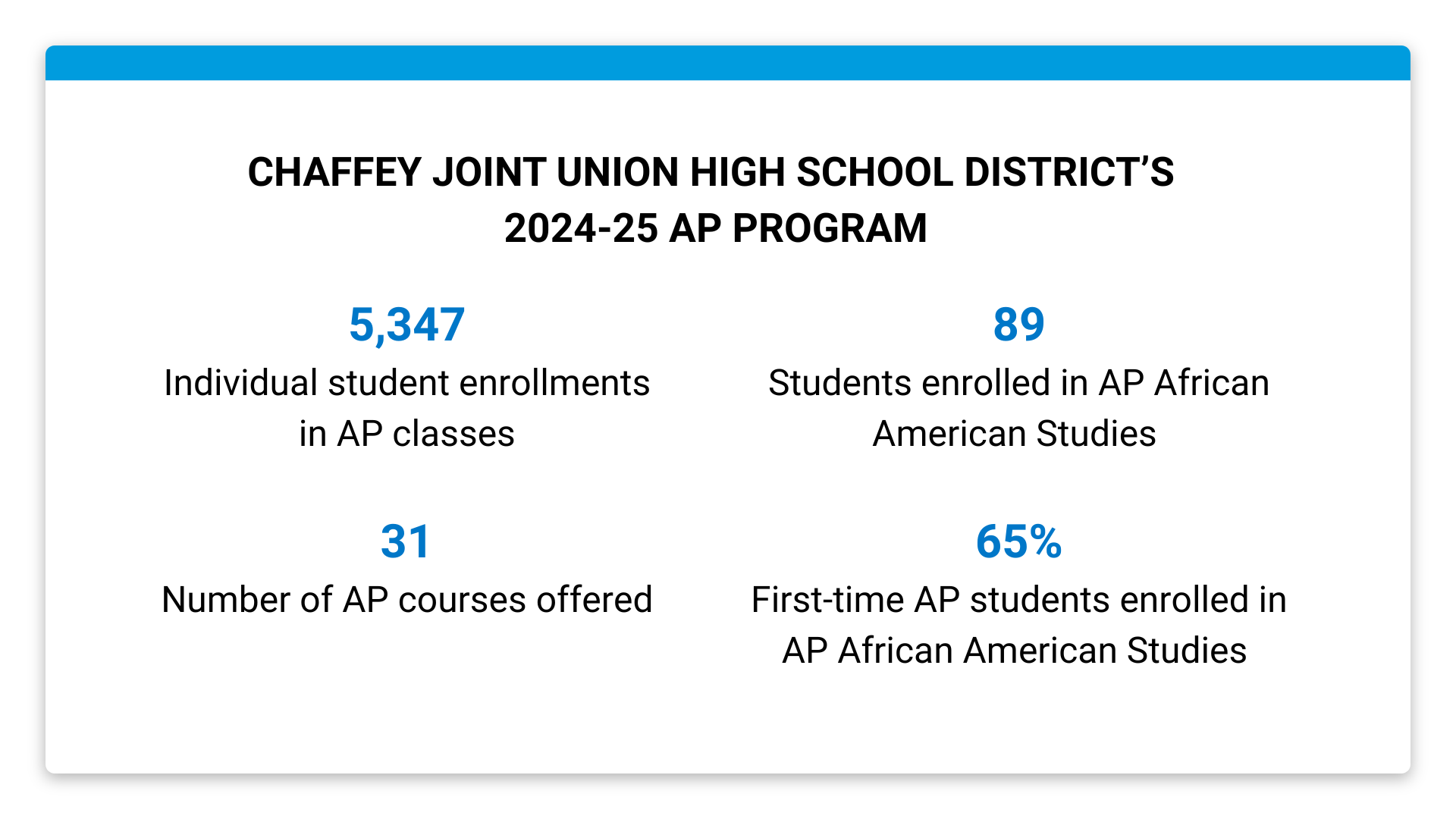Broadening AP Access with AP African American Studies
At Chaffey Joint Union High School District (CJUHSD) in San Bernardino County, Calif., we’ve found that AP African American Studies, the newest Advanced Placement® course from College Board, provides a transformative experience as students examine historical evidence for themselves, empowering them to explore a broad range of perspectives and experiences.
Like all AP courses, AP African American Studies calls for an open-minded approach to the histories and cultures of various communities. Notably, the skills developed and cultural awareness fostered by this course have drawn in more students who may not have explored Advanced Placement courses previously. Plus, they could receive college credit, advanced course placement, or both at more than 500 colleges and universities when earning an exam score of 3 or higher.
Identifying the Opportunity
First, we recognized that AP African American Studies fit well with our district’s vision and this strategic goal: “All students in the Chaffey Joint Union High School District will graduate ready for college and careers.”
Like many districts around the country, our high school graduation requirements are rooted in admission requirements for our state colleges and universities. For example, to be admitted to a University of California or California State University school, students must complete courses in disciplines represented on what’s known as the A–G list, which includes a history/social science course.
Another distinction specific to our students in California is the forthcoming mandatory completion of an ethnic studies course starting with students in the graduating Class of 2030.
AP African American Studies allows us to satisfy all of this with a single course.
Turning Opportunity Into Action
As superintendent of a school district that has an African American population that is 64% higher than the statewide African American population, Mathew Holton has stated, “I have always considered it to be my responsibility, along with the responsibility of our staff, to identify course inequities and improve access and opportunities for all students, particularly students of color. So, AP African American Studies represents an excellent opportunity to provide coursework that reflects a diverse society and promotes expanded understanding and empathy across all student groups.”
To achieve this goal, four CJUHSD schools began to offer this new interdisciplinary course during its 2023-24 pilot year and continue to offer it in the 2024-25 school year. Its rich mix of history, literature, the arts, geography, science, and law, coupled with its scaffolded structure, proved to be an appealing opportunity, especially for first-time AP students. In addition, teachers can use their own creative touch to meet the students at their level.
We selected a dynamic group of teachers from across our campuses to pilot the course and gave them dedicated time to build a professional learning community. With support from an instructional coach, they collaborated on innovative teaching approaches for the course.
An exciting course highlight is a three-week individual project that challenges students to research and consider multiple views about topics, rigorously weigh evidence, then draw their own conclusions. Projects completed by CJUHSD AP African American Studies students include “Lasting Impacts of African Traditions on Latino Culture,” “Black Disparities in Healthcare,” and “The Harlem Renaissance’s Lasting Impact on Black Culture.”
Leticia Morales, assistant principal of instruction at Los Osos High School, observes, “Students are learning to analyze complex issues from multiple perspectives, develop well-supported arguments, and collaborate effectively.”
“Students and parents are happy that this course is being offered. We’re hoping to expand and offer more sections next year.”
Julie Kawai, Assistant Principal
Evaluating the Outcomes
During the 2023-24 school year, the final pilot year for the course, 1,100 students from California public and private schools took the AP African American Studies Exam, with 79% earning a score of 3 or higher. At CJUHSD, specifically, the pass rate for AP African American Studies was 94%.
This course also opened the door for more students to experience AP, with 65% being new to the program. We take pride in creating an access point for students to participate in AP that might not have been available in years past.
Students leave the course academically stimulated and personally enriched, gaining insights into historical events that often aren’t covered in other history courses. At Etiwanda, the high school with the district’s largest African American student population, Assistant Principal Julie Kawai notes that “students feel empowered learning about their history through the African American lens, sharing their learning with their families, and engaging in avid discussions with friends.”
Practical Pointers
Welcoming All: This course has universal appeal and promotes diversity and inclusivity.
Teacher Support: AP Classroom, AP Summer Institutes, AP Mentoring, and dedicated online teacher communities enable teachers to connect to synergize their instruction.
Elective versus Required: If the course will fulfill a district graduation requirement, like history or social science, more students may be motivated to enroll.
Enriched Learning: This course brings the rich digital resources of the Smithsonian’s African American History and Culture Museum and the Gilder Lehrman Institute of American History right to your classroom.
Educator Perspectives
“I am incredibly proud of our teachers for their dedication and collaboration in bringing this course to life. Their commitment to creating an engaging and inclusive learning experience not only inspires students’ confidence but also ensures they see themselves reflected in the curriculum of such a rigorous course. The success of our students—both in their engagement with the material and in their performance onth e AP exam—underscores the impact of thoughtful, high-quality instruction, curriculum, and the opportunities it creates for their future.” — Jessica Kachaenchai, Ed.D., Assistant Superintendent, Instructional Services
“We also teach AP Computer Science Principles and AP Seminar. Combined with AP African American Studies, these courses foster a love of learning and prepare students for the future. Seeing their growth and enthusiasm is why these courses remain a cornerstone of the curriculum.” — Leticia Morales, Assistant Principal of Instruction

